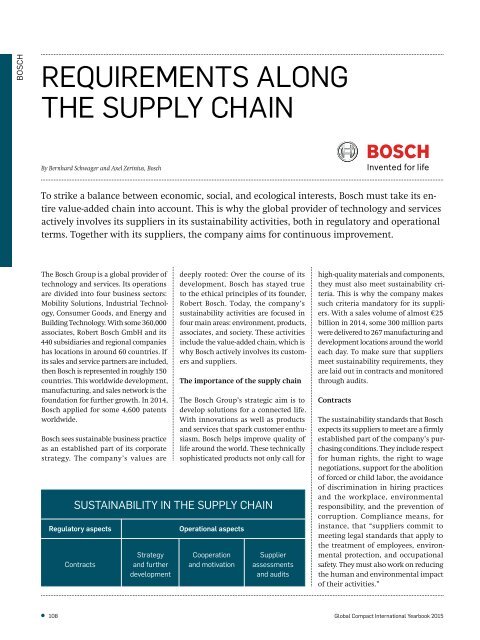Global Compact International Yearbook 2015
The Global Compact International Yearbook is with more than 400,000 readers one of the worlds leading CSR publications. In the new edition Leonardo DiCaprio speaks about business and sustainability. Declares DiCaprio: “We need to change our thinking and our sense of urgency .” Leonardo DiCaprio may be one of the world’s top movie stars, but he would rather be defined and respected more for his work as a committed environmentalist. Over the years, he has personally funded as well as helped to raise tens of millions of dollars for a variety of green-related causes. He believes that his greatest legacy will be the progress he has helped make toward safeguarding the planet against the ravages of global warming, pollution, and species protection. Other issues are: The state of CSR and 15th anniversary of the UN initiative Private Investment and Sustainable Development Voluntary Sustainability Standards Münster/New York 2015: 172 pages, paperback Publishing houses: macondo publishing/UN Publications Subscription (via UN Publications only): 30.00 USD (regular) 15.00 USD (reduced) ISBN13: 978-3-9813540-9-6 / ISSN-Print: 2365-3396 / ISSN-Internet: 2365-340x
The Global Compact International Yearbook is with more than 400,000 readers one of the worlds leading CSR publications. In the new edition Leonardo DiCaprio speaks about business and sustainability. Declares DiCaprio: “We need to change our thinking and our sense of urgency .” Leonardo DiCaprio may be one of the world’s top movie stars, but he would rather be defined and respected more for his work as a committed environmentalist. Over the years, he has personally funded as well as helped to raise tens of millions of dollars for a variety of green-related causes. He believes that his greatest legacy will be the progress he has helped make toward safeguarding the planet against the ravages of global warming, pollution, and species protection. Other issues are:
The state of CSR and 15th anniversary of the UN initiative
Private Investment and Sustainable Development
Voluntary Sustainability Standards
Münster/New York 2015: 172 pages, paperback
Publishing houses: macondo publishing/UN Publications
Subscription (via UN Publications only): 30.00 USD (regular) 15.00 USD (reduced)
ISBN13: 978-3-9813540-9-6 / ISSN-Print: 2365-3396 / ISSN-Internet: 2365-340x
- No tags were found...
You also want an ePaper? Increase the reach of your titles
YUMPU automatically turns print PDFs into web optimized ePapers that Google loves.
Bosch<br />
Requirements aLONG<br />
the SuPPLY Chain<br />
By Bernhard Schwager and Axel Zerinius, Bosch<br />
To strike a balance between economic, social, and ecological interests, Bosch must take its entire<br />
value-added chain into account. This is why the global provider of technology and services<br />
actively involves its suppliers in its sustainability activities, both in regulatory and operational<br />
terms. Together with its suppliers, the company aims for continuous improvement.<br />
The Bosch Group is a global provider of<br />
technology and services. Its operations<br />
are divided into four business sectors:<br />
Mobility Solutions, Industrial Technology,<br />
Consumer Goods, and Energy and<br />
Building Technology. With some 360,000<br />
associates, Robert Bosch GmbH and its<br />
440 subsidiaries and regional companies<br />
has locations in around 60 countries. If<br />
its sales and service partners are included,<br />
then Bosch is represented in roughly 150<br />
countries. This worldwide development,<br />
manufacturing, and sales network is the<br />
foundation for further growth. In 2014,<br />
Bosch applied for some 4,600 patents<br />
worldwide.<br />
Bosch sees sustainable business practice<br />
as an established part of its corporate<br />
strategy. The company’s values are<br />
deeply rooted: Over the course of its<br />
development, Bosch has stayed true<br />
to the ethical principles of its founder,<br />
Robert Bosch. Today, the company’s<br />
sustainability activities are focused in<br />
four main areas: environment, products,<br />
associates, and society. These activities<br />
include the value-added chain, which is<br />
why Bosch actively involves its customers<br />
and suppliers.<br />
The importance of the supply chain<br />
The Bosch Group’s strategic aim is to<br />
develop solutions for a connected life.<br />
With innovations as well as products<br />
and services that spark customer enthusiasm,<br />
Bosch helps improve quality of<br />
life around the world. These technically<br />
sophisticated products not only call for<br />
Sustainability in the supply chain<br />
Regulatory aspects<br />
Contracts<br />
Strategy<br />
and further<br />
development<br />
Operational aspects<br />
Cooperation<br />
and motivation<br />
Supplier<br />
assessments<br />
and audits<br />
high-quality materials and components,<br />
they must also meet sustainability criteria.<br />
This is why the company makes<br />
such criteria mandatory for its suppliers.<br />
With a sales volume of almost € 25<br />
billion in 2014, some 300 million parts<br />
were delivered to 267 manufacturing and<br />
development locations around the world<br />
each day. To make sure that suppliers<br />
meet sustainability requirements, they<br />
are laid out in contracts and monitored<br />
through audits.<br />
Contracts<br />
The sustainability standards that Bosch<br />
expects its suppliers to meet are a firmly<br />
established part of the company’s purchasing<br />
conditions. They include respect<br />
for human rights, the right to wage<br />
negotiations, support for the abolition<br />
of forced or child labor, the avoidance<br />
of discrimination in hiring practices<br />
and the workplace, environmental<br />
responsibility, and the prevention of<br />
corruption. Compliance means, for<br />
instance, that “suppliers commit to<br />
meeting legal standards that apply to<br />
the treatment of employees, environmental<br />
protection, and occupational<br />
safety. They must also work on reducing<br />
the human and environmental impact<br />
of their activities.”<br />
108 <strong>Global</strong> <strong>Compact</strong> <strong>International</strong> <strong>Yearbook</strong> <strong>2015</strong>

















